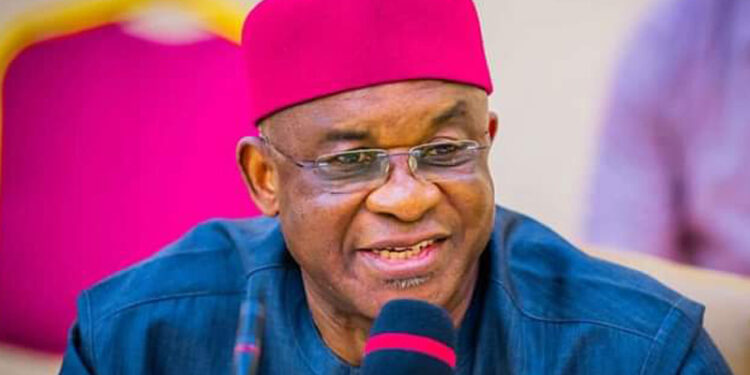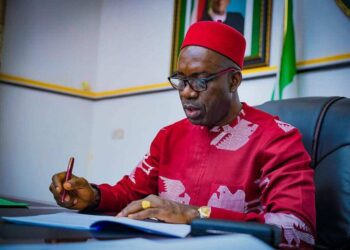The newly appointed chairman of Nigeria’s major opposition coalition has issued a stark warning that the country faces imminent transformation into a one-party state, declaring the alliance as the nation’s final opportunity to preserve democratic governance.
David Mark, the former Senate President now leading the African Democratic Congress-backed coalition, delivered the sobering assessment during Wednesday’s coalition launch in Abuja, painting a picture of systematic institutional capture by the current administration.
Speaking before assembled political leaders, civil society representatives, and party officials, Mark characterized the coalition’s formation as transcending mere electoral ambitions to become a rescue mission for Nigerian democracy itself.
“This coalition goes beyond gaining political power. It is a concerted effort to rebuild the crumbling pillars of Nigeria’s democracy,” Mark declared, framing the movement as an existential battle for the country’s democratic future.
The veteran politician leveled serious accusations against President Bola Tinubu’s government, alleging deliberate efforts to dismantle democratic institutions and consolidate authoritarian control. Mark claimed the administration has orchestrated what he termed an “unprecedented hijacking” of national institutions since assuming office.
“Since this administration took office two years ago, it has hijacked all democratic institutions and pushed Nigeria toward total civilian dictatorship,” he stated, suggesting the government’s actions represent a calculated assault on democratic norms.
Mark expanded his critique to encompass the government’s broader governance approach, launching particularly sharp attacks on its handling of corruption and accountability. He accused the administration of displaying unprecedented comfort with corrupt practices while showing disdain for transparent governance.
“We have never seen a government so much at home with corruption, a government that disdains accountability in all ramifications,” Mark asserted, contrasting current practices with previous administrations’ approaches to governance.
The coalition chairman expressed deep frustration with the government’s priorities, arguing that political maneuvering has taken precedence over addressing citizens’ basic needs. He highlighted the contradiction between widespread poverty and the administration’s focus on political activities.
Mark also addressed Nigeria’s persistent security challenges, criticizing the government’s response to ongoing violence across multiple regions. He described the administration as either unwilling or incapable of decisively confronting armed groups terrorizing communities nationwide.
“Bandits and kidnappers continue to kill innocent Nigerians daily, yet the government appears helpless or unwilling to act decisively,” he observed, pointing to the human cost of inadequate security responses.
The former Senate President extended his criticism to the National Assembly, accusing the legislative branch of abandoning its constitutional oversight role. He characterized the parliament as having become a “mere appendage of presidential authority,” enabling questionable policies to proceed without proper scrutiny.
Mark positioned the coalition as representing all Nigerians committed to national salvation, describing it as a “dangerous conspiracy against the Nigerian people” that patriotic citizens must resist. He emphasized the movement’s inclusive nature, encompassing opposition parties, youth organizations, civil society groups, and concerned citizens.
The ADC chairman outlined the coalition’s foundational principles, presenting them as direct alternatives to current governance practices. He articulated a vision emphasizing unity over division, service over rhetoric, and transparency over secrecy.
“Unity over division, service over slogans, action over excuses, compassion over inhumanity, transparency over opacity, inclusion over nepotism, real progress over endless rhetoric, performance over empty promises, rule of law over impunity, and justice over inequity,” Mark enumerated, providing a comprehensive manifesto for the coalition’s approach.
Mark emphasized that the coalition’s mission extends beyond the 2027 electoral cycle, describing it as a long-term commitment to democratic restoration. He spoke of rebuilding democratic safeguards and ensuring power remains rooted in popular will rather than elite manipulation.
“Our mission transcends any electoral calendar. It is a commitment to rebuild the guardrails of our democracy, to anchor power once again in the will of the people, and to hand to our children a nation worthy of their talents and their dreams,” he concluded.
The coalition’s formal adoption of the ADC as its political vehicle represents a significant development in Nigeria’s opposition landscape, bringing together diverse political forces under a single organizational structure. Mark’s leadership appointment reflects efforts to leverage his extensive political experience and cross-party relationships.
Wednesday’s event marked the coalition’s most significant public demonstration of unity since informal discussions began among opposition figures. The gathering’s composition, including former governors, presidential candidates, and civil society leaders, suggests broad-based support for the initiative.
The government has yet to respond to Mark’s allegations or the coalition’s formal launch, though the administration’s supporters are likely to challenge the opposition’s characterization of current governance practices. Political observers will watch closely to see whether the coalition can maintain cohesion while building grassroots support ahead of the 2027 elections.




















